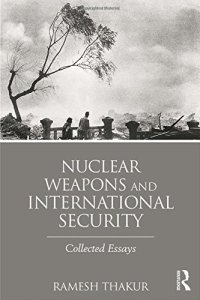
Ebook: Nuclear Weapons and International Security: Collected Essays
Author: Ramesh Thakur
This volume brings together writings by Prof. Ramesh Thakur on the challenge of nuclear weapons, covering more than three decades of researching, thinking and writing on the topic.
The core problem of this work can be disaggregated into several components. The essays approach the problem primarily as a normative and political project, not as an analytical project. Chapters 1–3 in Part One describe the scholar-practitioner interface in trying to come to grips with the nature and magnitude of the challenge, the main policy impact of the development of nuclear weapons on security strategy, and the different collective nuclear futures from among which policymakers must choose.
The bulk of the world’s nuclear weapons are held by Russia and the United States, who also conducted most of the nuclear testing. But in the 1980s and 1990s, world attention was focused on nuclear testing in the Pacific by France as an established NPT nuclear-weapons-state (NWS), then India and Pakistan as they broke through the NPT normative barrier to conduct nuclear tests in 1998 and consolidated their status as non-NPT nuclear-armed states, followed finally by North Korea which became the first country to defect from and break out of the NPT to conduct nuclear tests in 2006, 2009 and 2013. While the world is trying to figure out how to coax North Korea back into the NPT bottle, it is simultaneously struggling with the challenge of trying to keep Iran in the NPT non-nuclear box. Meanwhile, India has been accommodated as a de facto nuclear-armed state outside the NPT regime. The eight chapters in Part Two address these regional nuclear challenges.
The various regional challenges have served to highlight serious deficiencies in the normative architecture of the nuclear arms control and disarmament regime. The five chapters in Part Three deal with the international nuclear nonproliferation and disarmament machinery and regime, including regional nuclear-weapon-free zones. In addition, the nuclear proliferation and terrorism agendas merged as a nightmare challenge in the minds of policymakers after the terror attacks of 11 September 2001. This is discussed in chapter 15, while chapter 16 asks if the NPT anomalies have become so many and so substantial that the treaty is incapable of functioning much longer as the anchor of the global nuclear arms control regime.
The concluding chapter brings together the various disparate strands of the analysis to argue for moving towards a world of progressively reduced nuclear weapons in numbers, reduced salience of nuclear weapons in national security doctrines and deployments, and an eventually denuclearized world.
This book will be of much interest to students of nuclear proliferation, global governance, international organisations, diplomacy and security studies.